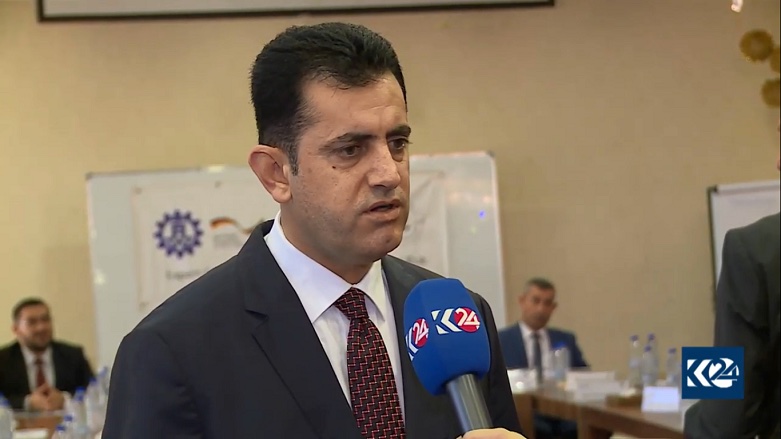Kurdistan Region continues to host largest number of refugees, IDPs in Iraq: JCC Director
According to the latest report on the situation, the Kurdistan Region has hosted the largest number of IDPs and refugees in Iraq.

ERBIL (Kurdistan 24) – Hoshang Mohammed, Director General of the Kurdistan Regional Government’s (KRG) Joint Crisis Coordination Centre (JCC), revealed on Monday that the Kurdistan Region continues to host the largest number of Internally Displaced Persons (IDPs) despite its financial challenges.
According to the latest report on the situation released on Dec. 30, the Kurdistan Region has hosted the largest number of IDPs and refugees in Iraq. “We host 99 percent of the Syrian refugees,” Mohammed told Kurdistan 24.
The JCC report said the KRG “has received and helped the vulnerable people without any discrimination and prejudice,” adding that “the displaced people in Kurdistan are from various sects, ethnicities, and religious backgrounds.”
Read KRG-Joint Crisis Coordination Centre's, @JccKrg, December 2020 #humanitarian situation report:#Kurdistan continues to host 956,759 displaced people. 698,902 are IDPs and 257,857 #refugeeshttps://t.co/fZF3aOUS5u
— KRG-USA (@KRG_USA) January 10, 2021
According to the JCC statistics, there were still 956,759 IDPs and refugees in the Kurdistan Region in 2020: a total of 698,902 IDPs, and also 238,170 Syrian, 8,452 Turkish, 10,535 Iranian, and 700 Palestinian refugees.
“The majority of IDPs and refugees live with the host communities in the Kurdistan Region, while only 29 percent live in the 35 camps,” the report added, noting that “39 percent of the total displaced population live in Erbil, 41 percent in Duhok, and 20 percent in Sulaimani.”
The report underlined that the KRG needs at least $895 million annually to provide the services displaced persons and Syrian refugees in the Kurdistan Region require.
JCC Director Mohammed told Kurdistan 24 that the situation is very challenging amid a financial crisis caused by the COVID-19 pandemic, including its effect on plummeting oil prices, and Baghdad’s decision to suspend payments of the autonomous region’s share of the national budget.
“It’s a very challenging situation; we have a lot of pressure on our financial capabilities and this has pushed the services to a limit,” he said, indicating that “continued support” is required, so they can keep helping vulnerable groups.
Since 2017, over half of the international support for IDPs and refugees in the Kurdistan Region has stopped. “With COVID-19, there has been less international cooperation for humanitarian support for IPDs and refugees,” Mohammed added.
“We need continued support from donors to enable us to maintain services to the displaced people and host communities until they go back to their place of origin since it is a shared responsibility,” he underlined.
The Kurdistan Region also supports a “voluntary return” of Iraqi IDPs to their homes. Last year, the Iraqi government decided to close down IDP camps across the country, sending displaced Iraqis to their homes.
Read More: Kurdistan Region supports ‘voluntary’ return of IDPs: President Nechirvan Barzani
“They [Iraq] made the decision,” Mohammed said, “but our policy remains consistent: we support the voluntary return of IDPs. We will not force people to go back. We don’t differentiate too much with Baghdad in supporting the return, but our difference with Baghdad is the mechanism of return.”
Mohammed said the KRG has continued to facilitate the voluntary return of IDPs and refugees since 2016.
According to the latest JCC update, a total of 37,139 IDPs and refugees left the Kurdistan Region in 2020 or returned to their homes. However, another 5,076 refugees and IDPs arrived in the autonomous Kurdish region.
There's instability in the number of IDPs in KRG, until the middle of the year the number of IDPs were decreasing, however, with the start of the cold season IDPs arrived to the camps. The number increased from 729,940 in August to 737,365 in September. https://t.co/ZcGHRpbeoB pic.twitter.com/ZsMeWex2xq
— JCC_KRG (@JccKrg) January 10, 2021
The report indicated that more IDPs arrived at camps in the Kurdistan Region following the start of winter, increasing the total number in September 2020 to 737,365 individuals, while in August the number was 729,940 people.
Meanwhile, the number of refugees is declining monthly, the report noted. “However, the instability and economic situation in Syria has had an impact on the return and migration of refugees,” it advised. “But they are more willing to return to their homes rather than remain displaced.”
Editing by Karzan Sulaivany